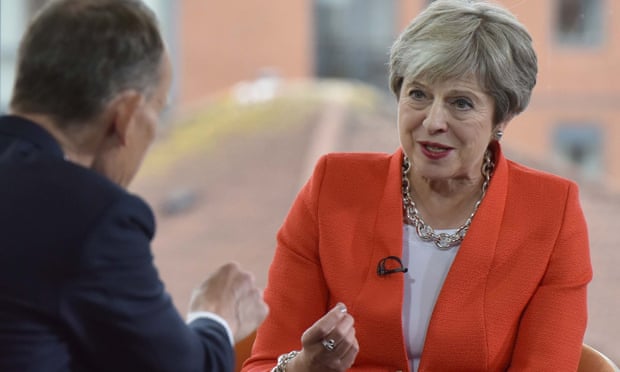I do believe in Brexit, May says – but won’t rule out compromises

Theresa May has refused to rule out further compromises in order to broker a final deal with the EU, but hit back at Boris Johnson after the departed foreign secretary questioned her belief in Brexit.
The prime minister was asked repeatedly whether she was prepared to make further concessions to the EU after European leaders rejected her proposal in Salzburg earlier this month, saying it would risk the integrity of the EU single market.
Speaking on the first day of the Conservative party conference in Liverpool, May told the BBC’s Andrew Marr Show that the government had to wait to hear the EU’s specific counter-proposals.
“We need to know what their concerns are,” she said. “This is challenging for the EU and I accept that. It is a deal like no other, they have not done it with anyone else. We believe it does not destroy the single market and we need to have that conversation with them.”
Overnight, May’s pre-conference announcements were overshadowed by comments by Johnson in an interview with the Sunday Times, in which he cast doubt on the prime minister’s commitment to leaving the EU compared with his own beliefs.
“Unlike the prime minister I campaigned for Brexit,” he said. “Unlike the prime minister I fought for this, I believe in it, I think it’s the right thing for our country and I think that what is happening now is, alas, not what people were promised in 2016.”
On Sunday, May said she was the one ensuring Brexit could be delivered. “I do believe in Brexit, but crucially I believe in delivering Brexit in a way that respects the vote and delivers on behalf of the British people, while also protecting our union, protecting jobs and ensuring we make a success of it,” she said.
The prime minister also admitted her party could not rule out a hard border in Northern Ireland in the event of no deal, but said there was not an alternative proposal on the table apart from her Chequers plan for a free trade area for goods, governed by a common UK-EU rulebook.
“If we get to the point of no deal … we as a United Kingdom government are still committed to doing everything we can to ensure there is no hard border between Northern Ireland and Ireland,” she said.
“But there is only one plan on the table at the moment that provides for that frictionless trade across the border and indeed between the UK’s other borders with the EU.”
Johnson, the most keenly watched challenger to the prime minister, has called for the May to ditch her plan and broker a deal similar to that the EU has with Canada, but one that would require customs checks on the Northern Irish border, which he says could be simplified with technology.
He said May’s proposal that Britain and the EU should collect each other’s tariffs was “entirely preposterous” and called the entire plan “deranged”.
May said it was wrong for critics of her Brexit plan to portray the alternative as a “free trade deal” and said the other alternative proposed was not a Canada-style deal, which took seven years to negotiate, but a very basic free trade agreement.
“People often differentiate Chequers from a free trade deal, but at the heart of Chequers is a free trade deal,” she said.
“If you have a free trade agreement, you have to agree the rules you’re going to trade on. Canada for the UK is not on the table from the EU. What is on the table is a basic free trade deal for Great Britain with Northern Ireland remaining in the customs union and single market.”
The former Brexit secretary David Davis, who departed the cabinet over the Chequers plan a day before Johnson, said he would vote against the prime minister’s plan as it stood.
“It will be a very, very exciting autumn in Westminster because the government, if it sticks with Chequers, will lose the vote,” he told Sky News. “Losing votes is always difficult for governments, but governments have lost votes in the past.”
He also cautioned his former cabinet colleague Johnson and said he would back May in any vote of no confidence. “Where I differ from Boris is that he is conflating the two,” he said. “This is such an important issue we must keep it away from internal Tory party battles and from leadership issues.”
The Scottish Conservative leader, Ruth Davidson, also made a thinly veiled dig at Johnson in her interview on Sunday morning, especially his admission that he did not fully appreciate the implications of the withdrawal agreement, where leaders agreed to implement a “backstop” to keep Northern Ireland in the customs union and parts of the single market to avoid a hard border, should no deal be reached.
“I don’t sit around the Cabinet table, I’m not in government. I do attend political cabinet. But I knew what was being said in December, I’m not quite sure how the foreign secretary didn’t,” she said.
“He hasn’t even mentioned the fact that he was foreign secretary for two years and was in the room helping to influence this and, indeed, was praising it as soon ago as December.”
The Labour chair, Ian Lavery, said the interview showed May was “tinkering around the edges” rather than rebuilding Britain. “The Tories are clearly too busy fighting among themselves and have neither the ideas nor the desire to offer real solutions to the problems they have caused,” he said.
Related News

Indian opposition leader demands answers from Modi after Trump’s jet claim
New Delhi, JUL 19: India’s opposition leader has demanded an explanation from Indian Prime MinisterRead More

Palestine condemns mass killings at aid distribution centers
RAMALLAH, JUL 19 /DNA/ – The Ministry of Foreign Affairs and Expatriates – State ofRead More


Comments are Closed